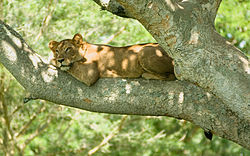సింహం
| సింహం | |
|---|---|

| |
| మగ సింహం | |

| |
| ఆడ సివంగి | |
| Scientific classification | |
| Kingdom: | |
| Phylum: | |
| Class: | |
| Order: | |
| Family: | |
| Genus: | |
| Species: | P. leo
|
| Binomial name | |
| Panthera leo (లిన్నేయస్, 1758)
| |

| |
| Distribution of lions in Africa | |
| Synonyms | |
|
(లిన్నేయస్, 1758) | |

సింహం (ఆంగ్లం: Lion) ఒక కౄర జంతువు. మృగాలకు రాజుగా 'మృగరాజు' అని సింహాన్ని పిలుస్తారు. ఇది ఎక్కువగా అటవీ ప్రాంతంలోని మైదానాలలో నివసిస్తుంది. సింహాలు 5 నుంచి 10 వరకు గుంపుగా ఉంటాయి. పొడవు 5 నుంచి 8 అడుగులు, బరువు 150 నుంచి 250 కిలోల వరకు ఉంటుంది. మగ సింహం జూలును కలిగి ఉంటుంది.
సింహాలు ఒక రోజులో 20 గంటలు విశ్రాంతి తీసుకుంటూ, ఎక్కువగా రాత్రులు వేటాడుతుంటాయి. వీటి ఆహారం జింకలు, కంచర గాడిదలు, అడవి పందులు, అడవి దున్నలు. ఆడ సింహాలే ఎక్కువగా వేటాడుతుంటాయి ఆసియా ఖండంలో అవి అంతరించే దశకు చేరుకున్నాయి. ఇంతకు పూర్వం సింహాలను సర్కస్లలో పెట్టి ఆడించెడివారు. ఇది వరకు సింహం మన జాతీయ జంతువు కూడా.
ఆసియాటిక్ సింహం
[మార్చు]ఆసియాటిక్ సింహం పాంథెరా లియో లియో జాతికి చెందినది. ఇవి ప్రస్తుతం భారతదేశంలో మాత్రమే జీవించి ఉన్నాయి.[2] 20వ శతాబ్దం ప్రారంభం నుండి, దీని పరిధి గిర్ నేషనల్ పార్క్, గుజరాత్ రాష్ట్రంలోని పరిసర ప్రాంతాలకు పరిమితం చేయబడింది. చారిత్రాత్మకంగా, వీటి ఉనికి మధ్యప్రాచ్యం నుండి ఉత్తర భారతదేశం వరకు ఉండేది.[3]
ఆసియాటిక్ సింహం మొదటి శాస్త్రీయ వివరణను 1826లో ఆస్ట్రియన్ జంతుశాస్త్రజ్ఞుడు జోహన్ ఎన్. మేయర్ ప్రచురించారు. దీనికి ఫెలిస్ లియో పెర్సికస్ అని పేరు పెట్టారు. ది ఇంటర్నేషనల్ యూనియన్ ఫర్ కన్జర్వేషన్ ఆఫ్ నేచర్ (IUCN) రెడ్ లిస్ట్లో, ఇది తక్కువ జనాభా పరిమాణం, ఆక్యుపెన్సీ ప్రాంతం కారణంగా అంతరించిపోతున్న దాని పూర్వపు శాస్త్రీయ నామమైన పాంథెర లియో పెర్సికా క్రింద జాబితా చేయబడింది.[4] 19వ శతాబ్దం వరకు, ఇది సౌదీ అరేబియా,[5][6] తూర్పు టర్కీ, ఇరాన్, మెసొపొటేమియా, పాకిస్తాన్, సింధు నదికి తూర్పు నుండి బెంగాల్, మధ్య భారతదేశంలోని నర్మదా నది వరకు విస్తరించి ఉండేది.[7]
వీటి జనాభా క్రమంగా 2010 నుండి పెరిగింది.[8] 2015 మేలో, 14వ ఆసియా సింహాల గణన సుమారు 20,000 కి.మీ2 (7,700 చ. మై.); సింహం జనాభా 523గా అంచనా వేయబడింది. ఇందులో 109 మగవి, 201 ఆడవి కాగా 213 పిల్లలు ఉన్నాయి.[9][10][11] 2017 ఆగస్టులో, సర్వేయర్లు 650 అడవి సింహాలను లెక్కించారు.[12][13] 2020 జూన్లో, గిర్ అటవీ ప్రాంతంలో 674 ఆసియాటిక్ సింహాలు ఉన్నట్లు అంచనా వేయబడింది, ఇది 2015 జనాభా లెక్కల సంఖ్య కంటే 29% పెరిగింది.[14]
భారతీయ సింహం
[మార్చు]భారతదేశానికి చెందిన ఐదు పాంథరైన్ పిల్లులలో సింహం ఒకటి.[15][16] ఇవి బెంగాల్ టైగర్ ( పి. టైగ్రిస్ టైగ్రిస్), భారతీయ చిరుతపులి ( పి. పార్డస్ ఫుస్కా), స్నో చిరుత (పి. ఉన్సియా), క్లౌడెడ్ చిరుతపులి (నియోఫెలిస్ నెబులోసా). భారతీయ సింహాన్ని పెర్షియన్ సింహం అని కూడా పిలుస్తారు.[17][18]
మూలాలు
[మార్చు]- ↑ Nowell & Bauer (2004). Panthera leo. 2006. IUCN Red List of Threatened Species. IUCN 2006. www.iucnredlist.org. Retrieved on 11 May 2006. Database entry includes a lengthy justification of why this species is vulnerable
- ↑ Kitchener, A. C.; Breitenmoser-Würsten, C.; Eizirik, E.; Gentry, A.; Werdelin, L.; Wilting, A.; Yamaguchi, N.; Abramov, A. V.; Christiansen, P.; Driscoll, C.; Duckworth, J. W. (2017). "A revised taxonomy of the Felidae: The final report of the Cat Classification Task Force of the IUCN Cat Specialist Group" (PDF). Cat News. Special Issue 11: 71–73.
- ↑ Nowell, K.; Jackson, P. (1996). "Asiatic lion" (PDF). Wild Cats: Status Survey and Conservation Action Plan. Gland, Switzerland: IUCN/SSC Cat Specialist Group. pp. 37–41. ISBN 978-2-8317-0045-8.
- ↑ Breitenmoser, U.; Mallon, D. P.; Ahmad Khan, J.; Driscoll, C. (2008). "Panthera leo ssp. persica". IUCN Red List of Threatened Species. 2008: e.T15952A5327221.
- ↑ Nader, I. A. (1989). "Rare and endangered mammals of Saudi Arabia" (PDF). In Abu-Zinada, A. H.; Goriup, P. D.; Nader, L. A (eds.). Wildlife conservation and development in Saudi Arabia. Riyadh. pp. 220–228. Archived from the original (PDF) on 2019-01-26. Retrieved 2021-12-12.
{{cite book}}:|work=ignored (help)CS1 maint: location missing publisher (link) - ↑ Bauer, H.; Packer, C.; Funston, P. F.; Henschel, P. & Nowell, K. (2016). "Panthera leo". IUCN Red List of Threatened Species. 2016: e.T15951A115130419.
- ↑ Pocock, R. I. (1939). "Panthera leo". The Fauna of British India, including Ceylon and Burma. Mammalia. – Volume 1. London: Taylor and Francis Ltd. pp. 212–222.
- ↑ Singh, H. S.; Gibson, L. (2011). "A conservation success story in the otherwise dire megafauna extinction crisis: The Asiatic lion (Panthera leo persica) of Gir forest" (PDF). Biological Conservation. 144 (5): 1753–1757. doi:10.1016/j.biocon.2011.02.009.
- ↑ Venkataraman, M. (2016). "Wildlife and human impacts in the Gir landscape". In Agrawal, P. K.; Verghese, A.; Krishna, S. R.; Subaharan, K. (eds.). Human Animal Conflict in Agro-Pastoral Context: Issues & Policies. New Delhi: Indian Council of Agricultural Research. p. 32−40.
- ↑ Singh, H. S. (2017). "Dispersion of the Asiatic lion Panthera leo persica and its survival in human-dominated landscape outside the Gir forest, Gujarat, India". Current Science. 112 (5): 933–940. doi:10.18520/cs/v112/i05/933-940.
- ↑ Singh, A. P. (2017). "The Asiatic Lion (Panthera leo persica): 50 Years Journey for Conservation of an Endangered Carnivore and its Habitat in GIR Protected Area, Gujarat, India". Indian Forester. 143 (10): 993–1003.
- ↑ Kaushik, H. (2017). "Lion population roars to 650 in Gujarat forests". The Times of India. Retrieved 9 August 2017.
- ↑ Nandakumar, A. (2017). "Gir forest Asiatic lion brimming population needs translocation to Madhya Pradesh". India Live Today. Archived from the original on 2017-08-09. Retrieved 9 August 2017.
- ↑ "Lions roar in Gujarat's Gir! Population of Asiatic Lions up by 29%". The Financial Express. 10 June 2020.
- ↑ Jhala, Y. V.; Qureshi, Q.; Sinha, P. R. (2011). Status of tigers, co-predators and prey in India, 2010. TR 2011/003 (PDF). Dehradun: National Tiger Conservation Authority, Govt. of India, New Delhi, and Wildlife Institute of India. p. 302. Archived from the original (PDF) on 2012-01-20.
- ↑ Pandit, M. W.; Shivaji, S.; Singh, L. (2007). You Deserve, We Conserve: A Biotechnological Approach to Wildlife Conservation. New Delhi: I. K. International Publishing House Pvt. Ltd. ISBN 9788189866242.
- ↑ Heptner, V. G.; Sludskii, A. A. (1992) [1972]. "Lion". Mlekopitajuščie Sovetskogo Soiuza. Moskva: Vysšaia Škola [Mammals of the Soviet Union, Volume II, Part 2]. Washington DC: Smithsonian Institution and the National Science Foundation. pp. 83–95. ISBN 978-90-04-08876-4.
- ↑ Humphreys, P.; Kahrom, E. (1999). "Lion". Lion and Gazelle: The Mammals and Birds of Iran. Avon: Images Publishing. pp. 77−80. ISBN 978-0951397763.

